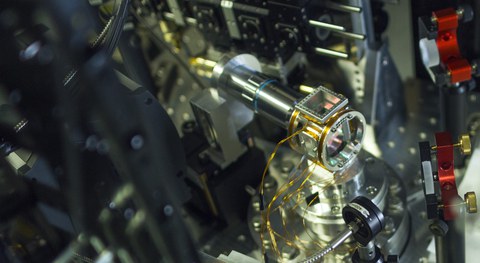Jan 21, 2025
Quantum repeaters enable secure quantum networks of the future: The ComNets Chair at TUD launches new joint project with federal funding

Setup for a miniaturized ion trap for use in a quantum repeater node on a fiber test track.
Networks driven by quantum physics promise a high level of security against IT sabotage, espionage or "hybrid warfare." The basis for such networks are quantum repeaters, the development of which will be funded by the Federal Ministry of Education and Research in a new research network starting in January 2025. This project will demonstrate quantum repeater concepts using demonstrators outside of laboratory environments. The ComNets Chair at TU Dresden is part of the team working on the network.
Everyone knows repeaters from home: they help to boost the home WiFi connection so that it can reach spots that the router alone struggles to reach. When cleverly placed, these small devices considerably extend the range of data transmission.
New level of security
Scientists in Germany have been researching extremely complex quantum repeaters for years. The Deutsche Telekom Chair of Communication Networks (ComNets) is also part of the newly established research project "Quantenrepeater.Net (QR.N)," which is funded by the Federal Ministry of Education and Research. Alongside 41 other partners from research and industry, they are working to analyze and establish quantum networks.
Such networks are becoming crucial for free societies and the protection of our critical infrastructure. This is because the principles of quantum physics make such networks effectively spy-proof. Quantum repeaters enable the secure transmission of information over long distances and make an important contribution to the establishment of a quantum-secure IT infrastructure: they open the door to quantum networks and also the prospect of secure networking of future quantum computers.
The quantum states for communication in the quantum network must be generated with high quality, stored temporarily and transmitted with as little loss as possible. However, in order to transform a simple connection between two points into an entire network, nodes are needed that temporarily store these quantum states and ensure transmission to the next node - repeaters.
This presents a challenge
"Exchanging quantum information over extended distances presents us with an enormous challenge. Nevertheless, the potential benefits of this technology can hardly be overestimated, as it is the only way to ensure secure, robust and tactile telecommunications in the future," explains Caspar Arndt Hopfmann, project member representing ComNets.
With its mobile and strongly entangled phonon pair sources, the ComNets Chair at TU Dresden provides the QR.N project network with a central component. These sources are a fundamental component for the realization of long-range quantum communication networks using quantum repeater systems based on entanglement exchange operations - and are therefore intrinsic to the QR.N project network.
What the future holds
One of the dedicated aims of the consortium is to develop the basis for establishing "quantum-secured communication" in Germany in a few years' time. This is of great importance to our society, especially when it comes to IT security and the protection of critical infrastructure. "In the longer term, quantum repeaters will play their part in the development of quantum information technology for public communication systems," says Christoph Becher - Professor of Quantum Optics at Saarland University and speaker for the research network - outlining one of the overarching goals of the research project.
Quantum repeaters will therefore not be mass-produced electronic goods, unlike their inconspicuous household kin. But their significance for our society will be all the greater.
Background:
The "Quantenrepeater.Net (QR.N)" project will start on January 1, 2025. It is being funded by the Federal Ministry of Education and Research with a total of EUR 20M over three years. A total of 42 research institutions and companies are working together to develop the fundamental building blocks of a quantum network based on quantum repeaters. The project is based on the results of the "Quantum Repeater.Link (QR.X)" project, which was also funded by the BMBF. This project, under the leadership of Christoph Becher, took the first steps in researching the development of a quantum repeater in Germany from 2021 to the end of 2024. Projects in a similar vein were being carried out as early as 2010.
More information:
TU Dresden Press Office
Email:
Tel.: +49 351 - 463 32398
Prof. Christoph Becher
Email:
Tel.: +49 681 3022466
Project profile on the BMBF website:
https://www.forschung-it-sicherheit-kommunikationssysteme.de/projekte/quantenrepeater-net-qr.n
